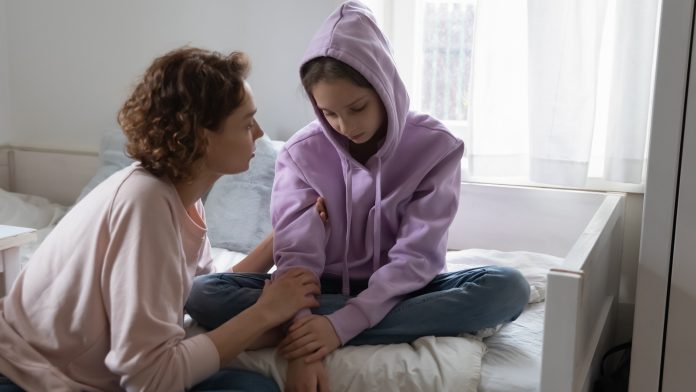
A new national poll in the US finds that nearly 60% of parents received a visit from a health professional for their children’s mental health.
It is well documented that the pandemic has negatively impacted children’s mental health but to what extent? A national poll records the magnitude of the downfall of children’s mental health and the role of the healthcare system.
The new report follows the announcement that children’s mental health was declared a national emergency in the US and utilises responses from 1,201 parents of children aged 11-18 surveyed in October 2021.
“Even before the pandemic, mental health disorders in adolescents, such as depression and anxiety, were prevalent,” said Mott Poll co-director and Mott paediatrician Gary L. Freed, MD, MPH.
“The pandemic caused significant stress and social disruption for kids that likely exacerbated these problems, as we’re seeing a growing number of young people face mental health concerns. This places a heavier burden on parents, health providers and other trusted adults in their lives to be aware of potential warning signs.”
The findings come from a nationally representative report from the University of Michigan Health C.S. Mott Children’s Hospital National Poll on Children’s Health in collaboration with the Children’s Hospital Association.
Children’s mental health concerns
A third of parents in the study recorded that their child had completed a mental health screening question at their primary care office; however, only four in ten parents noted that healthcare providers asked about their children’s mental health. One in seven noted that their provider never asks about their children’s mental health concerns.
“Regular check-ups are the best time for providers to discuss potential mental health concerns,” Freed said. “If parents feel their adolescent’s provider is not being proactive in raising these issues, they should bring it up with them.”
It’s also important for adolescents themselves to feel comfortable seeking help, Freed noted.
Furthermore, only a quarter of parents polled thought their child would talk to them about a possible mental issue, and even fewer thought their adolescent would open up with their primary care provider.
Identifying warning signs
Prior to the COVID-19 pandemic, one in five adolescents had a diagnosable mental health disorder, including depression and anxiety. However, many reports outlined that the pandemic may have worsened children’s mental health.
When their children’s mental health appears to change, parents who partook in the poll noted that they would know what signs to look for. The parents said that comments about being worried or anxious, moodiness, decreased interaction with family, a drop in grades or changes in sleep or eating patterns. They also illustrated that if they noticed their children’s mental health declining, they would talk to them or keep a closer eye on behaviour changes.
The stigma of mental illness may make parents hesitant to seek help or delay seeking care for their adolescent as they may think the symptoms will go away on their own, Freed said. But it’s important to take the next step if needed.
“Signs of struggles with mental health can look different for every child, and some may be easier to recognise than others,” Freed said. “Parents should take seriously any major changes to their baseline behaviour that could be a symptom of something more concerning.
“If adolescents seem overwhelmed by trying to manage challenges, parents should seek professional help.”
Navigating the healthcare system for mental health support
More than half of parents say they decided on their own to have their adolescent see a mental health specialist, while less than one in five got a referral from their adolescent’s primary care provider or school. But even after recognising a problem, some parents stated they had trouble navigating the health system to find a mental health evaluation or treatment options.
Furthermore, almost half of parents looking for support for their children’s mental health described difficulties in receiving the appropriate care, including long wait times, finding a provider who took their insurance or saw children, with 10% of parents stating they did not know where to go with it.
“Difficulties finding and getting mental health care for youth reflects strains in our current mental health system and highlights the need for more ways to support parents and their children,” added Amy Wimpey Knight, president of CHA.
“Parents whose children need mental health help should remember they aren’t alone. But they may need to be proactive and persistent in seeking support from a provider, their school, or family or friends in caring for mental health issues.”







